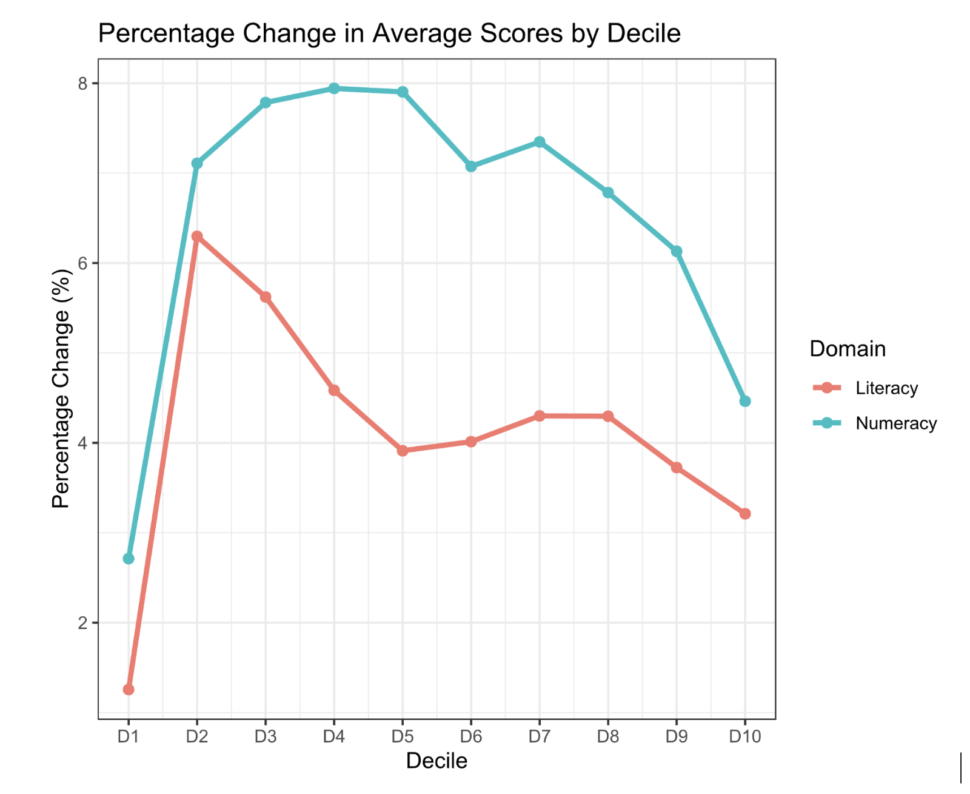Between 2012 and 2023, young adults in England went from being one of the worst-performing groups in the OECD for literacy and numeracy to one of the best, making improvements on a scale not seen across other countries or other age groups in England.
The Survey of Adult Skills (PIAAC) shows dramatic improvements in essential skills among 16 to 24-year-olds. Literacy scores improved by seven per cent and numeracy by nine per cent.
Some, including the current skills minister Jacqui Smith, have attributed this improvement to schools. However, we have not seen similar improvements among 15-year-olds in PISA (the Programme for International Student Assessment). Between 2012 and 2022, their scores stagnated. Improvements in maths for year five and nine in TIMSS (Trends in International Mathematics and Science Study) were not on the same scale as the increase seen for 16 to 24-year-olds.
The 16-19 condition of funding, introduced in 2014, has drastically increased the continued study of English and maths, supporting around 3 million young people over the decade – specifically the lower attainers who would be represented in the bottom half of the PIAAC distribution.
Concerning lack of progress
The graphic below shows the average improvement among young adults between 2012 and 2023 by decile of the PIAAC distribution. Decile 1 (D1) are the lowest 10 per cent of students and decile 10 (D10) the highest.
It shows how the largest improvements were concentrated in the bottom half of the distribution, particularly for literacy. This signals improvements arising from resits.
But it also demonstrates a very concerning lack of progress for the bottom 10 per cent of students.

Students in decile 2 (between the 10th and 20th percentile of achievement) make the most progress in literacy and numeracy, with a huge spike in attainment between deciles 1 and 2. These are students very likely to have been subject to the resit policy. In numeracy, improvements have been larger and spread across more of the distribution (deciles 2 to 7 make more than 7 per cent improvements in scores). This wider increase in numeracy probably reflects the growth of A-level and Core mathematics.
We can triangulate these improvements against the increase in 16-19 English and maths achievement from 16.4 per cent in 2012/13 to 28.9 per cent in 2018/19 (the last year before Covid grading interferes with analysis). Taken together, the evidence suggests the condition of funding has been effective on average.
Remaining stuck
However, the bottom 10 per cent of the distribution is concerning. These learners should continue to study English and maths during their post-16 education. But between 2012 and 2023, they remained stuck at the lowest standard on the PIAAC scale.
This aligns with the curriculum and assessment review’s interim report finding that those “with lower grades [at 16] were less likely to achieve” by 19, though the report did not explore the causes in detail.
One is that these young adults are more likely to have not been in education or training (NET) between the ages of 16 and 18 (when they would have been resitting GCSE English and maths). The rate of NET for 16 to 18-year-olds between 2012 and 2023 ranged from 12 to 15 per cent.
They are not well served by ‘flexibilities’
There are also many flexibilities in the resit policy that are likely to disproportionately exclude lower attainers from continued study. The policy’s ‘tolerance’ allows institutions to not provide further study of GCSE English and maths for up to 5 per cent (changing to 2.5 per cent) of their entire student body. This disproportionately affects lower attainers and those with additional learning needs.
Moreover, EHCP (education, health and care plan) learners can be exempted altogether rather than being given extra support.
Finally, the policy allows learners with lower prior attainment to study towards functional skills, which has half the guided learning hours of the GCSE. These flexibilities are likely resulting in less English and maths support for those who need it most.
The huge improvements in young adult literacy and numeracy over the last 10 years deserve to be celebrated. They have been concentrated among the bottom half of students, suggesting that the resit policy has had a material impact on literacy and numeracy for young adults.
Sadly, students at the bottom 10 per cent of the distribution have been left behind. They are more likely to be disadvantaged, have additional needs, and are not being well-served, both by the unintended consequences of ‘flexibilities’ and by a 16-19 education system that sees too many students become NET. This needs to be a clear focus for the ongoing curriculum and assessment review.

















Your thoughts